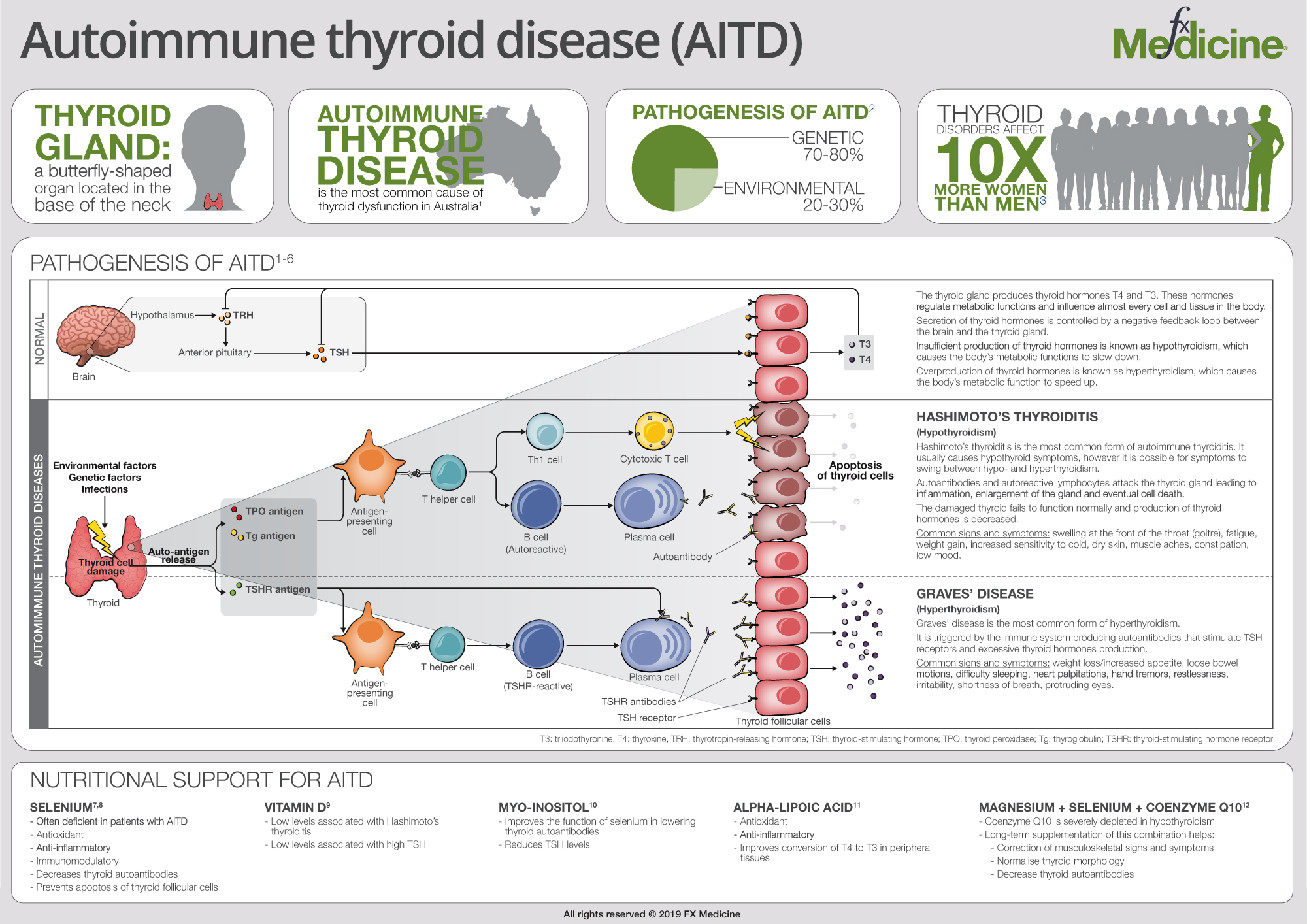
Autoimmune thyroid diseases (AITDs) include Graves’ disease and Hashimoto’s thyroiditis and are the most common form of thyroid dysfunction, affecting women more than men.
These conditions are the outcome of complex interactions between environmental and genetic factors resulting in reactivity to self-thyroid antigens causing inflammation and affecting the secretion of thyroid hormones.
In the case of Graves’ disease, autoantibodies bind to TSH receptors typically leading to stimulation of the thyroid gland and hyperthyroidism. On the other hand, Hashimoto’s thyroiditis is characterised by lymphocytic infiltration, inflammation and hypothyroidism.
Major environmental triggers of AITD include medications, infection, smoking, stress and iodine. There is also growing evidence showing a role for diet in preventing, delaying or reversing the expression of genetically determined autoimmune diseases.
Numerous nutritional deficiencies have been identified as contributing factors to the cause of thyroid disorders and include vitamin D, selenium, magnesium, coenzyme Q10 and alpha-lipoic acid.
In this infographic we take a closer look at thyroid function, the pathogenesis of AITDs and nutritional support for this condition.
References
- Walsh JP. Managing thyroid disease in general practice. MJA 20616;205(4):179-184. [Full Text]
- Wiersinga WM. Clinical relevance of environmental factors in the pathogenesis of autoimmune thyroid disease. Endocrinol Metab (Seoul) 2016;31(2):213-222. [Full Text]
- The thyroid gland. The Australian Thyroid Foundation 2016. [Link]
- Hashimoto’s disease. Mayo Clinic 2014. [Link]
- Graves’ disease. Mayo Clinic 2014. [Link],
- Fountoulakis S, Tsatsoulis A. On the pathogenesis of autoimmune thyroid disease: a unifying hypothesis. Medscape 2016. [Link]
- Duntas LH. The role of iodine and selenium in autoimmune thyroiditis. Horm Metab Res 2015;47(10):721-726. [Abstract]
- de Farias CR, Cardoso BR, de Oliveira GM, et al. A randomized-controlled, double-blind study of the impact of selenium supplementation on thyroid autoimmunity and inflammation with focus on the GPx1 genotypes. J Endocrinol Invest 2015;38(10):1065-1074. [Abstract]
- Kim D. Low vitamin D status is associated with hypothyroid Hashimoto’s thyroiditis. Hormones (Athens) 2016 Jul 11. [Epub ahead of print] [Abstract]
- Nordio M, Pajalich R. Combined treatment with myo-inositol and selenium ensures euthyroidism in subclinical hypothyroidism patients with autoimmune thyroiditis. J Thyroid Res 2013;2013:424163. [Full text]
- Chen K, Yan B, Wang F, et al. Type 1 5’-deiodinase activity is inhibited by oxidative stress and restored by alpha-lipoic acid in HepG2 cells. Biochem Biophys Res Commun 2016;472(3):496-501. [Abstract]
This image by FX Medicine is licensed under a Creative Commons Attribution-NonCommercial-NoDerivatives 4.0 International License.
More information about how to share/use the infographics for personal use.
If you interested in using any FX Medicine content for commercial use please contact us.
DISCLAIMER:
The information provided on FX Medicine is for educational and informational purposes only. The information provided on this site is not, nor is it intended to be, a substitute for professional advice or care. Please seek the advice of a qualified health care professional in the event something you have read here raises questions or concerns regarding your health.



